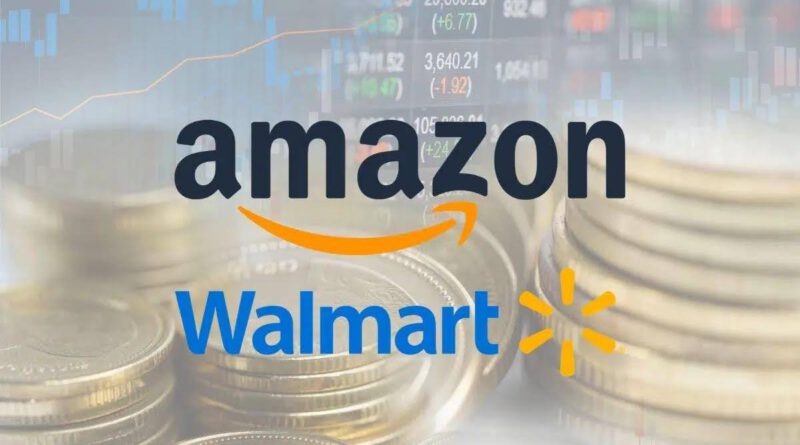Amazon and Walmart’s Stablecoin Ambitions Could Disrupt Crypto Payments Landscape
Key Takeaways:
- Amazon, Walmart, and Ant Group are reportedly exploring the launch of their own USD-pegged stablecoins.
- The move could reduce billions in credit card fees and shift major payment volumes away from traditional banks.
- Crypto insiders believe these companies are further along in development than publicly acknowledged.
The retail and tech world is inching closer to a fundamental shift in payment infrastructure. Amazon and Walmart are reportedly assessing the feasibility of launching their own stablecoins—a move that could dramatically reshape the crypto landscape and pose challenges to traditional finance.

Big Retail Players Eye Stablecoin Launches
According to multiple sources familiar with internal discussions, retail titans Amazon and Walmart have begun exploring the launch of stablecoins pegged to the U.S. dollar. These digital currencies would serve as alternatives to credit card payments and wire transfers, enabling faster, cheaper, and borderless transactions.
This comes amid rising interest from corporations in digital payment infrastructure. Alibaba’s fintech arm Ant Group is reportedly surging forward with its Singapore subsidiary poised to seek stablecoin licenses in Hong Kong and Luxembourg.
Industry experts reckon these players act largely out of desire for drastically reduced costs and tight ecosystem control simultaneously. Merchants currently shell out 2–3% credit card processing fees which stablecoin-based payments might slash drastically thereby freeing up some serious cash. For Amazon that equates roughly into possibly saving between nine and thirteen billion dollars each year based on e-commerce revenues surpassing 447 billion dollars in 2024.
Read More: Major Crypto Milestone: Mastercard Launches Stablecoin Payments in Partnership with MoonPay
Why Stablecoins Appeal to Retail Giants
Cost Efficiency and Speed
Stablecoins provide a clear advantage for merchants. Traditional card networks such as Visa and Mastercard incur interchange and transaction fees that scale up rapidly with volume. It would allow companies like Amazon or Walmart to issue their own stablecoins and bypass intermediaries, keep customer data and save on costs.
Better yet, cross-border transactions, which are notoriously slow and expensive, could have settled instantly over blockchain rails, rendering SWIFT or local clearinghouses unnecessary. And for big multinationals that do business in dozens of jurisdictions, this isn’t just a convenience — it’s a competitive advantage.
Ecosystem Expansion
Amazon and Walmart both have their own digital wallets and ecosystems, which positions them favorably to integrate a company-specific token. Through the distribution of stablecoins, they can establish closed systems where users earn, spend, and even stake tokens within the ecosystem – enhancing retention and data insight capabilities.
Ant Group’s precedent is notable here. Its Alipay platform already integrates with blockchain-based services, and its expansion into stablecoin issuance could serve as a model for Western retailers.
Traditional Payment Networks React
The news of Amazon and Walmart’s potential stablecoin ventures rattled traditional payment stocks. On Friday, Visa shares dropped 5%, while Mastercard fell 4.7%. The declines reflect concerns that corporate-issued stablecoins could erode the market share of incumbent networks.

Yet analysts remain cautious. As Dan Dolev of Mizuho Securities told Barron’s, “The key question is will consumers actually adopt a stablecoin and be willing to use it for payments?”
Merchants have previously attempted bypassing card networks. A retail consortium spearheaded now-defunct CurrentC project in 2010s which failed miserably due largely to lack of consumer enthusiasm. Experts reckon corporate stablecoins must deliver super smooth user experience and hefty incentives for succeeding pretty quickly nowadays.
Read More: First U.S. Bank Issues Stablecoin on a Permissionless Blockchain
Regulatory Framework Still Evolving
Much feasibility for Amazon or Walmart stablecoins hinges precariously on legislative trajectory of Genius Act a proposed US bill mandating stablecoin issuers maintain reserves in cash or highly liquid assets one-to-one. Passage of the Act might elucidate compliance obligations enabling major corporations to proceed rapidly with their respective ambitious plans now.
At present, stablecoin regulations remain fragmented. However, a push for U.S. regulatory clarity is gaining momentum. Several U.S. lawmakers and Treasury officials have expressed support for a federal framework that ensures safety without stifling innovation.
Until such regulations are enacted, companies may pursue licenses in friendlier jurisdictions such as Singapore or Luxembourg, as Ant Group has reportedly done.
The post Amazon and Walmart’s Stablecoin Ambitions Could Disrupt Crypto Payments Landscape appeared first on CryptoNinjas.
CryptoNinjas





















